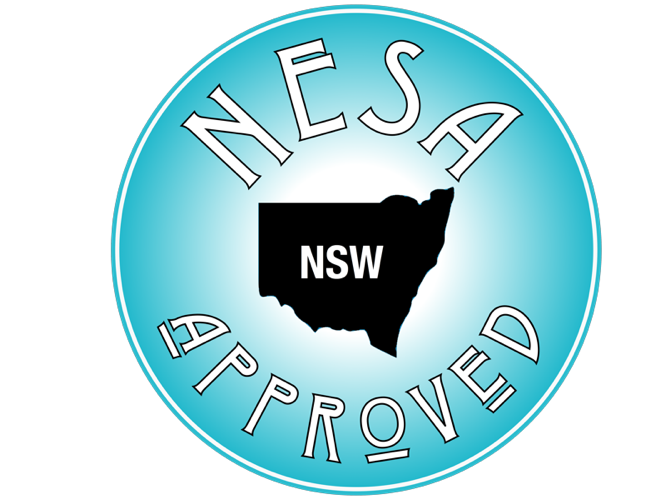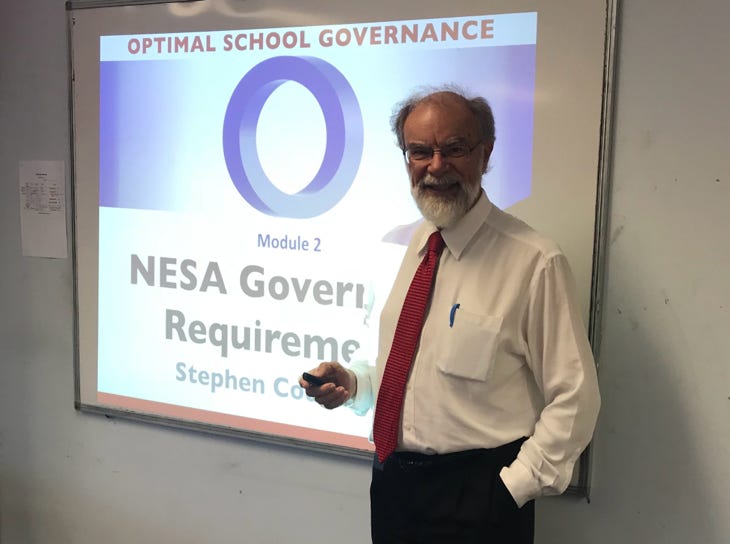NESA professional development


We offer 11 NESA approved and accredited training courses

The New South Wales Education Act requires registered non-government schools to have and implement policies and procedures for the proper governance of the school. For board members and others defined as ‘responsible persons’, this requires the following minimum professional learning:
Our courses have been especially designed to promote effective governance in New South Wales non-government schools. The courses also inform board members, trustees and other ‘responsible persons’ of their mandatory obligations under the New South Wales Education Act. The 11 courses have been approved by NESA to fulfil the requirements of Sections 3.9.3.4 and 3.9.3.5 of the Act, thus satisfying the professional learning obligations of all ‘responsible persons’ as well as the induction training program required for new ‘responsible persons’.
The three type-N courses offer concise broad overviews based on combinations of modules.
The eight type-S courses offer more in-depth, tailored training for boards that are interested in improving their performance and effectiveness.
All courses are delivered as face-to-face interactive workshops, usually delivered at the school or another suitable venue organised by the school. Upon completion of a course, a NESA-compliant signed letter is issued to the school certifying the course’s name, content covered, duration of the course, venue, and the names of those persons who attended.
For details of each course, click the course title button to the right to go to the page listing details of each course.
OSG-N1:
This four hour course introduces ‘responsible persons’ to the NESA requirements pertaining to proper governance of schools, and expands this by introducing some key facets of effective school board effectiveness. Content covered includes NESA requirements, governance vs management, healthy boards, the Board-Head relationship, and evaluating the board.
OSG-N2:
This eight hour course introduces ‘responsible persons’ to the NESA requirements pertaining to proper governance of schools, and expands this by developing an effective understanding of the principles and practices of ‘best practice’ in school board effectiveness. Content covered includes NESA requirements, governance vs management, dysfunctional boards, healthy boards, staying focussed in a crisis, the Board-Head relationship, fiduciary duties compliance, board meetings and dynamics and evaluating the board.
OSG-S8:
“‘Responsible persons’ (must) have relevant qualifications, skills and experience for governing the school properly” (NESA Requirements, section 3.9.3.1). In order to “govern properly”, the board and its members must understand how to direct change that will be positive and effective. This four hour course identifies NESA compliance requirements for ‘responsible persons’ that often result from or cause change in schools, and then proceeds to equip ‘responsible persons’ with the skills and understandings required to manage and direct change positively. Change has always been a feature of education, but the scale and pace of change today are unprecedented, and the role of boards and their ‘responsible persons’ in directing and managing change in schools is pivotal. The course helps ‘responsible persons’ to understand the forces of disruptive change that impact schools, and provides practical strategies to help ‘responsible persons’ steer change in their schools that will work to enhance the welfare of its students, faculty and staff, as well as ensuring that the school remains true to its founding principles while operating within the framework and requirements of the NESA Requirements for Proper Governance.
OSG-S6:
An important part of the board’s role is to “develop, implement and review risk management strategies in relation to strategic direction, governance, operations and finance”. One effective way of minimising risk is to avoid the pitfalls of poor governance. This four hour course helps ‘responsible persons’ to identify and be on the lookout for structures, processes and practices that have the potential to generate significant risk, and in extreme cases, crises. Practical frameworks are presented and trialled to help boards resolve conflicts and work more productively. Content covered includes poor governance as the Achilles heel of school effectiveness, the importance of understanding a school’s distinctive culture, how school cultures differ from corporate cultures, adding value and minimising risk, understanding governance and management, the accountability-responsibility relationship, what can go wrong (problem board members, problematic board dynamics), school board effectiveness and student achievement, characteristics of good governance, resolving disagreements, creative problem solving, the risks inherent in leadership transitions, solutions to foreseeable risks and essentials for building a stronger board.
OSG-S5:
A key component of the role of ‘responsible persons’ is to “provide strategic guidance”. It is also a NESA requirement that ‘responsible persons’ have “relevant qualifications, skills and experience for governing the school properly”. Therefore, if ‘responsible persons’ are to be effective in their duties, they must understand how to develop and sustain the school’s mission, vision and strategic direction. This four hour course helps ‘responsible persons’ understand the important differences between mission, vision and strategic direction, and equips them with a practical framework to develop and then implement strategic guidance in the school from a governance perspective. Content covered includes what is meant by mission and vision, what makes a good mission statement, strategic plan vs strategic vision, types of vision statement, internal and external reality, planning for an unknown future, shifting paradigms and their implications, the changing nature of work, changing economic and cultural paradigms, changing educational practices, student differences and learning styles, the scope and nature of a strategic vision, how to develop a strategic vision, strategic outcomes, the board’s role in steering the vision, the five sustainabilities, and drafting appropriate mission and vision statements.
OSG-S7:
‘Responsible persons’ accept a vast range of duties and obligations when they accept their roles. If boards are to function effectively, all ‘responsible persons’ must understand the breadth and depth of their duties, as well as their legal duty to fulfil them to the best of their ability. Duties fall into two broad categories; fiduciary and non-fiduciary duties. This four hour course helps ‘responsible persons’ understand and implement their duties of governance within the framework and requirements of the NESA Requirements for Proper Governance. Content covered includes duties of care, loyalty and obedience, related parties transactions, fiduciary duties compliance (legal, financial, program oversight and risk management), and non-fiduciary duties compliance (board policies, school policies, environmental sustainability, school reputation, demographics and change leadership). Understandings of ‘best practices’ for each theme are developed through specially designed self-evaluations.
OSG-N3:
This two day course introduces ‘responsible persons’ to the NESA requirements pertaining to proper governance of schools, and then provides opportunities through discussion and problem-solving for board members to build a unity of understanding, a common purpose, and a commitment to implementing ‘best practices’ for effective school governance in a strategic manner that enhances the school’s outcomes. Content covered includes NESA requirements, governance vs management, staying focussed in a crisis, dysfunctional boards, healthy boards, mission and vision, the Board-Head relationship, board meetings and dynamics, board composition and succession, fiduciary duties compliance, other board duties, community engagement, and evaluating the board.
OSG-S4:
Many of the perennial challenges that confront schools such as student achievement, faculty recruitment, staff morale, public identity, financial viability, risk management, and so on, can be traced back to the importance of clarifying the roles of governance (the board) and management (the faculty and staff). This four hour course helps ‘responsible persons’ appreciate the power of the accountability-responsibility relationship between governance and management in the context of various governance models, and provides a practical framework to enhance the board’s effectiveness in this area by working collectively through several hypothetical scenarios. Content covered includes the nature of the board and its powers, the accountability-responsibility relationship, the significance of the governance-management divide, the delegations schedule, the role of committees, models of governance, supervisory arrangements, and reporting requirements. Understandings of accountability and responsibility are developed through several specially designed hypotheticals.
OSG-S3:
If boards are going to govern a school successfully, satisfying its legal obligations, managing risk, providing strategic guidance and monitoring performance, then its members must understand how to provide effective leadership and direction. This four hour course helps ‘responsible persons’ understand effective leadership within the framework of governance, and provides a practical framework to provide constructive and purposeful leadership. Content covered includes what is leadership, the characteristics that define leadership, what makes a good leader, the importance of integrity, the value of diversity in board membership, leadership qualities, competitive vs co-operative leadership, guiding schools to maximise performance and manage risk, building future capacity, implications of change, leading change into the future, types of board tasks, and board effectiveness. Understandings of decision-making effectiveness are developed through a specially designed exercise.
OSG-S2:
Healthy boards don’t just happen by accident; they need to be planned, directed and managed if they are to operate effectively. This four hour course helps ‘responsible persons’ understand the characteristics of effective boards and the factors that help create and sustain them, as well as providing insights into the forces that can derail effective governance while providing constructive ways to combat and manage crises. Content includes the importance of focussing on the mission, what makes a great board, characteristics of high quality governance, code of conduct, conflicts of interest, exceptional boards, the importance of ongoing learning, sustaining a healthy board, handling crises, increasing pressures on boards, common features of unhappiness, forms of protest, dangerous reactions by boards, the role of the Head and the board in a crisis, and right and wrong actions under pressure. Understandings of crisis management are developed through four hypothetical case studies.
OSG-S1:
Proper governance requires a school’s ‘responsible persons’ to have in place structures, policies and procedures for governance, leadership, authority, decision-making accountability and transparency. This eight hour course helps ‘responsible persons’ understand and implement effective board operations within the context of each school’s distinctive philosophy and traditions, its framework of governance, and the NESA Requirements for Proper Governance. Content includes the Board-Head relationship, overseeing the Head, engagement with the Head, board engagement with the community, board composition and succession, board meetings and dynamics, evaluating the board, and notifying NESA. Understandings of effective board operations are developed through hypothetical case studies.
We are a NESA approved and accredited training provider of courses relating to proper governance in non-government schools.
D2015/35965 – D2019/8657 – D2019/23247 – D2019/134103 – D2024/436504